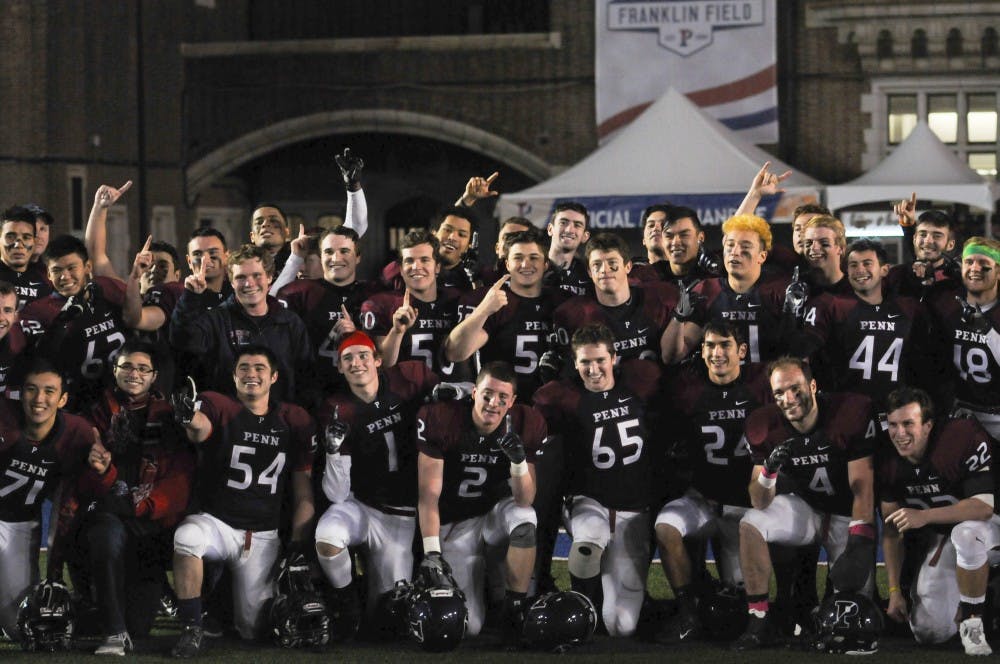
Although most Penn athletes will not go on to play professionally, the goal-oriented culture they create prepares them well for life after Penn.
Credit: Nick Buchta , Nick BuchtaWhile I was home for winter break, I was at a holiday party catching up with old family friends and came to an interesting, yet unsurprising conclusion: the main demographic for these columns is not actually Penn students, but middle-aged men with whom my dad is friends with on Facebook.
They say every great writer must know his audience, so, from here on out, I will be writing exclusively about Bruce Springsteen, a disdain for video games, and how much better the 80’s were than any given time period.
This decade may have Beyoncé and Kanye, but basically all movies are sequels nowadays. The kids don’t know what they missed- the 80’s had Top Gun, Airplane, AND Caddyshack.
I’m just kidding. That was just one of many column ideas I pitched before the editors finally let me write this one.
These conversations did, however, make me think about how finite my own athletic career is, and what I want to make of it. As everyone reminded me when talking about sports, “it goes fast” and “you only get so many games.”
As someone who is painfully aware of my own athletic mortality, I am constantly thinking about the clock ticking down on my own playing career. My personal athletic goals have changed plenty of times since I was an 8th grader, hellbent on winning a Rose Bowl as the quarterback for USC. I have accomplished some goals, failed to achieve most other goals (see: column in which I admit to being a loser), but with time I think I have been able to refine the goals I make for myself, athletic and otherwise, to make them both bolder and more attainable.
In athletics at any level, goals must be specific to have any reasonable chance of being accomplished. These goals can be big or small. Here at Penn, most teams aim to win an Ivy League Championship, as opposed to my high school baseball team, not exactly a traditional power house, that set a goal of winning 10 games for the first time in almost 20 years (a goal we did not accomplish, despite the sweet #QuestForTen shirts one of the parents made for us).
These specific goals, especially in sports, give us a great template as to how to set short term goals. They are often binary — you win or you don’t — and then you have a whole offseason to try to accomplish those goals and address areas where you were weak.
Maybe you lost too many games because of turnovers, so you work on ball control in the gym or on the practice field. Maybe your team had injury issues so you get smarter about how you use the weight room. Whatever the case, a team or a player can usually point to an area or areas that they can do to improve going forward.
Essentially, it’s one big game of trial and error. If you strike out, you have a next at bat to see the curve ball coming or keep your eye on the fastball you know is coming on the first pitch. Likewise, I am still trying to correct for not being 6-foot-4 in my Rose Bowl fantasy.
But as I’ve learned, some goals have to be more nebulous, more unformed. A majority of high school and college athletes do not go on to play professionally or represent their country after their college career is over. But for me, and many I know here at Penn and at other schools, while we know our names won’t be called at the NFL draft, we want to leave our programs in better shape than we got them. There is no one measure for success or failure for this — there are too many things that make certain programs unique and great.
It allows you, though, to move from the world of sports, where goals are often very binary and tangible, to the real world, where the scores are much more complex, and wins and losses are much more muddled. You have to come up with your own measures of success, and transition to a more complex view where goals and outcomes won’t be so simple, but will be important all the same.
The Daily Pennsylvanian is an independent, student-run newspaper. Please consider making a donation to support the coverage that shapes the University. Your generosity ensures a future of strong journalism at Penn.
Donate




